丧钟为谁而鸣诗歌
- 格式:docx
- 大小:21.18 KB
- 文档页数:2
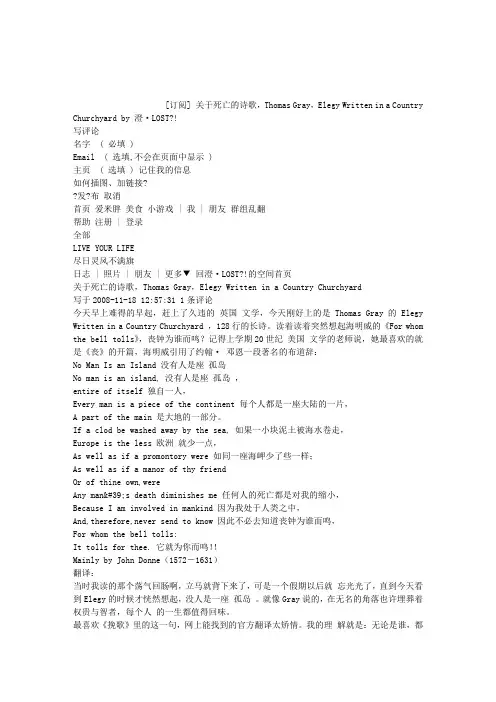
[订阅] 关于死亡的诗歌,Thomas Gray,Elegy Written in a Country Churchyard by 澄·LOST?!写评论名字 ( 必填 )Email ( 选填,不会在页面中显示 )主页 ( 选填 ) 记住我的信息如何插图、加链接??发?布取消首页爱米胖美食小游戏 | 我 | 朋友群组乱翻帮助注册 | 登录全部LIVE YOUR LIFE尽日灵风不满旗日志 | 照片 | 朋友 | 更多▼回澄·LOST?!的空间首页关于死亡的诗歌,Thomas Gray,Elegy Written in a Country Churchyard写于2008-11-18 12:57:31 1条评论今天早上难得的早起,赶上了久违的英国文学,今天刚好上的是Thomas Gray的 Elegy Written in a Country Churchyard ,128行的长诗。
读着读着突然想起海明威的《For whom the bell tolls》,丧钟为谁而鸣?记得上学期20世纪美国文学的老师说,她最喜欢的就是《丧》的开篇,海明威引用了约翰·邓恩一段著名的布道辞:No Man Is an Island 没有人是座孤岛No man is an island, 没有人是座孤岛,entire of itself 独自一人,Every man is a piece of the continent 每个人都是一座大陆的一片,A part of the main 是大地的一部分。
If a clod be washed away by the sea, 如果一小块泥土被海水卷走,Europe is the less 欧洲就少一点,As well as if a promontory were 如同一座海岬少了些一样;As well as if a manor of thy friendOr of thine own,wereAny man's death diminishes me 任何人的死亡都是对我的缩小,Because I am involved in mankind 因为我处于人类之中,And,therefore,never send to know 因此不必去知道丧钟为谁而鸣,For whom the bell tolls:It tolls for thee. 它就为你而鸣!!Mainly by John Donne(1572-1631)翻译:当时我读的那个荡气回肠啊,立马就背下来了,可是一个假期以后就忘光光了,直到今天看到Elegy的时候才恍然想起,没人是一座孤岛。
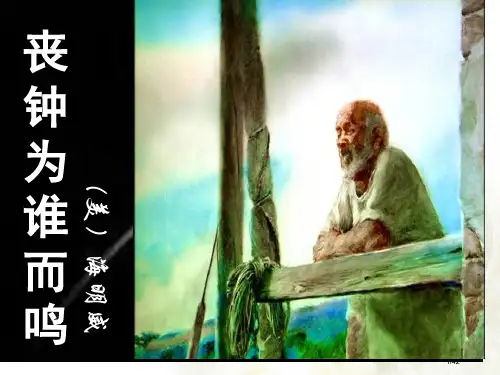
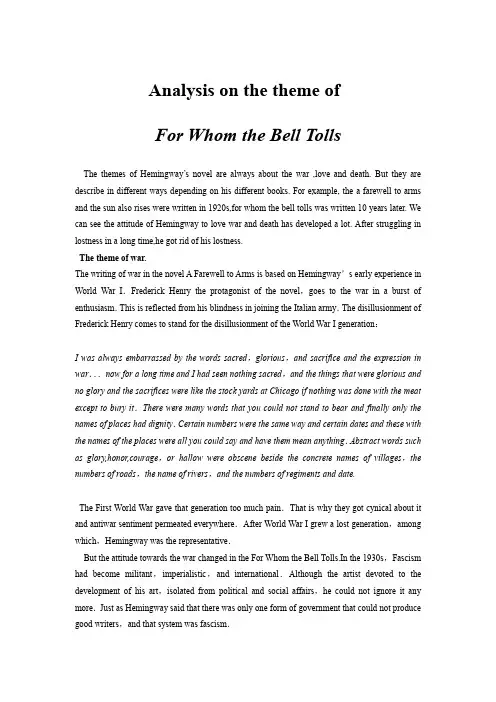
Analysis on the theme ofFor Whom the Bell TollsThe themes of Hemingway’s novel are always about the war ,love and death. But they are describe in different ways depending on his different books. For example, the a farewell to arms and the sun also rises were written in 1920s,for whom the bell tolls was written 10 years later. We can see the attitude of Hemingway to love war and death has developed a lot. After struggling in lostness in a long time,he got rid of his lostness.The theme of war.The writing of war in the novel A Farewell to Arms is based on Hemingway’s early experience in World War I.Frederick Henry the protagonist of the novel,goes to the war in a burst of enthusiasm.This is reflected from his blindness in joining the Italian army.The disillusionment of Frederick Henry comes to stand for the disillusionment of the World War I generation:I was always embarrassed by the words sacred,glorious,and sacrifice and the expression in war...now for a long time and I had seen nothing sacred,and the things that were glorious and no glory and the sacrifices were like the stock yards at Chicago if nothing was done with the meat except to bury it.There were many words that you could not stand to bear and finally only the names of places had dignity.Certain numbers were the same way and certain dates and these with the names of the places were all you could say and have them mean anything.Abstract words such as glory,honor,courage,or hallow were obscene beside the concrete names of villages,the numbers of roads,the name of rivers,and the numbers of regiments and date.The First World War gave that generation too much pain.That is why they got cynical about it and antiwar sentiment permeated everywhere.After World War I grew a lost generation,among which,Hemingway was the representative.But the attitude towards the war changed in the For Whom the Bell Tolls.In the 1930s,Fascism had become militant,imperialistic,and international.Although the artist devoted to the development of his art,isolated from political and social affairs,he could not ignore it any more.Just as Hemingway said that there was only one form of government that could not produce good writers,and that system was fascism.Robert Jordan,the protagonist of the novel For Whom the Bell Tolls,is not only a teacher of Spanish and a lover of Spain;he is also a writer,just like Hemingway.As an artist he is fully aware of the threat of fascist domination.But he take the duty without hesitate. And he came to the poor village and made friends with the soldiers. In the end of the article , he was not fear of death. He felt he could fight for the people who are oppressed by the fascism.Like the feeling you expected to have but did not have when you made your first communion.It was a feeling of consecration to a duty toward all the oppressed of the world which would be a difficult and embarrassing to speak out as religious experience and yet it is authentic as the feeling you had when you heard Bach,or stood in Charters Cathedral or the Cathedral at Leon and saw the light coming through the great windows⋯.It gave you a part in something that you could believe in wholly and completely....It was something that gave much importance to it and the reasons for it that your own death seemed of complete unimportance ....But the best thing was that there Was something you could do without this feeling--You could fight.Human LifeMany characters die during the course of the novel, and we see characters repeatedly question what can possibly justify killing another human being. Anselmo and Pablo represent two extremes with regard to this question. Anselmo hates killing people in all circumstances, although he will do so if he must. Pablo, on the other hand, accepts killing as a part of his life and ultimately demonstrates that he is willing to kill his own men just to take their horses. Robert Jordan’s position about killing falls somewhere between Anselmo’s and Pablo’s positions. Although Robert Jordan doesn’t like to think about killing, he has killed many people in the line of duty. His personal struggle with this question ends on a note of compromise. Although war can’t fully absolve him of guilt, and he has “no right to forget any of it,”Robert Jordan knows both that he must kill people as part of his duties in the war, and that dwelling on his guilt during wartime is not productive.The question of when it is justifiable to kill a person becomes complicated when we read that several characters, including Andrés, Agustín, Rafael, and even Robert Jordan, admit to experiencing a rush of excitement while killing. Hemingway does not take a clear moral stance regarding when it is acceptable to take another person’s life. At times he even implies that killing can be exhilarating, which makes the morality of the war in For Whom the Bell Tolls even murkier.Romantic LoveEven though many of the characters in For Whom the Bell Tolls take a cynical view of human nature and feel fatigued by the war, the novel still holds out hope for romantic love. Even the worldly-wise Pilar, in her memories of Finito, reveals traces of a romantic, idealistic outlook on the world. Robert Jordan and Maria fall in love at first sight, and their love is grand and idealistic. Love endows Robert Jordan’s life with new meaning and gives him new reasons to fight in the wake of the disillusionment he feels for the Republican cause. He believes in love despite the fact that other people—notably Karkov, who subscribes to the “purely materialistic”philosophy fashionable with the Hotel Gaylord set—reject its existence. This new acceptance of ideal, romantic love is one of the most important ways in which Robert Jordan rejects abstract theoriesin favor of intuition and action over the course of the novelFace the DeathFor Whom the Bell Tolls was written after the defeat of the Republic.During the Spanish War,Hemingway saw many heroic deeds.Hemingway,just as Robert Jordan,the hero of the novel,seemed to have found something worth dying for.If you die as these men did.then physical death means nothing and you can say as you breathe your last“Death,where is thy sting?or to use Hemingway’s own words“Those who have entered it honorably,and no man ever entered earth more honorably than those who died in Spain already have achieved immortality.Even though you died without having won,your sacrifice was not in vain,and victory shall yet be yours.Robert Jordan,like many Hemingway’s heroes,is obsessed by death from the beginning of the novel.death,Robert Jordan grows out of the fear of death at last and shows his courage in the face of death.For he has fervent belief in the cause of fighting for the people he loves deeply,as well as his perfect fulfillment in love.time.The bridge is successfully destroyed,and Jordan is mortally wounded.Instead of committing suicide,he decides to stay behind to cover the retreat of the guerrillas with his sub—machine gun.So he accomplishes his personal achievement through self-sacrifice.Each one does what he can,he thinks.He can do nothing for himself but perhaps he can do something for another.He dies not only for Spain,not only to save the girl Maria who he loves,but also his own sake in fulfillment of a moral duty.The grim world in which he had grown up has not broken Jordan nor forced him to a deal with his conscience.Jordan dies a moral victor.Whether one has fear of it or not.one’s death is difficult to accept.Sordo had accepted it but there was no sweetness in its acceptance even atfifty·two,with three wounds and him surrounded on a hill.He joked about itto himself but he looked at the sky and at the far mountains and heswallowed the wine and he did not want it.If one must die,he thought,andclearly one must,1 can die.But 1 hate it.Dying Was nothing and he had nopicture of it for fear of it in his mind.But living was a field of grain blowingin the wind on the side of a hill.Living Was a hank in the sky.Living was anearthen jar of water in the dust of the threshing with the grain flailed out andthe chaff blowing.Living Was a horse between your legs and a carbine underone leg and a hill and a valley and a stream with trees along it and the farside of the valley and the hills beyond.”Hemingway’s heroes grow up,and step by step their idea of meaning of life changes and crystallizes.参考文献1.靳伟英走出迷惘的迷雾—《丧钟为谁而鸣》的主题思想[学位论文]硕士 20022.张娜解读海明威死亡主题【学位论文】硕士 2006。
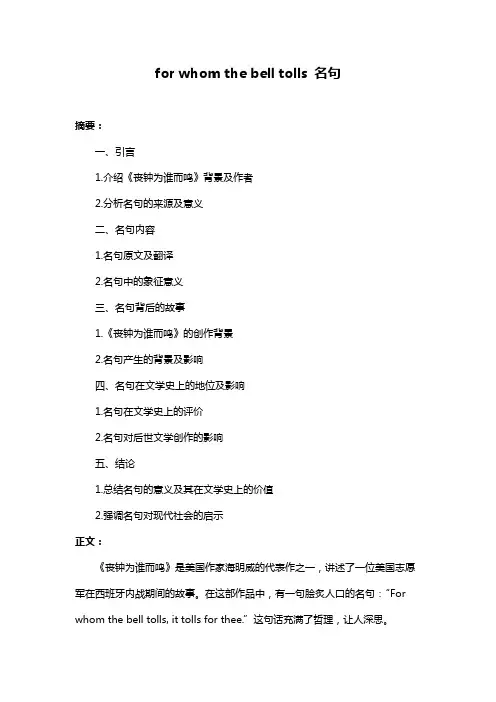
for whom the bell tolls 名句摘要:一、引言1.介绍《丧钟为谁而鸣》背景及作者2.分析名句的来源及意义二、名句内容1.名句原文及翻译2.名句中的象征意义三、名句背后的故事1.《丧钟为谁而鸣》的创作背景2.名句产生的背景及影响四、名句在文学史上的地位及影响1.名句在文学史上的评价2.名句对后世文学创作的影响五、结论1.总结名句的意义及其在文学史上的价值2.强调名句对现代社会的启示正文:《丧钟为谁而鸣》是美国作家海明威的代表作之一,讲述了一位美国志愿军在西班牙内战期间的故事。
在这部作品中,有一句脍炙人口的名句:“For whom the bell tolls, it tolls for thee.”这句话充满了哲理,让人深思。
这句名句的原文翻译为:“丧钟为谁而鸣,它为你而鸣。
”它意味着在这个世界上,没有人可以独善其身,每个人都会受到周围环境的影响。
当丧钟响起时,它不仅为别人而鸣,也是为自身而鸣。
这种观念强调了人类命运的紧密相连,以及个体在社会中的责任和担当。
这句名句背后的故事源于《丧钟为谁而鸣》的创作背景。
海明威在西班牙内战期间,以志愿者身份参加了反法西斯战斗。
他在作品中塑造的主人公罗伯特·乔丹,就是以自己为原型创作的。
名句“For whom the bell tolls, it tolls for thee.”出现在作品的结尾,表达了海明威对人类命运的关注,以及对战争的深刻反思。
这句名句在文学史上具有很高的地位,被誉为海明威最具哲理的句子之一。
它对后世文学创作产生了深远的影响,许多作家在作品中都引用了这句话。
这句名句也启示人们要关注社会问题,勇于承担责任,为人类的共同命运而努力。
综上所述,名句“For whom the bell tolls, it tolls for thee.”揭示了人类命运的紧密相连,强调了个体在社会中的责任和担当。
这句名句在文学史上具有很高的价值,并给现代社会带来了深刻的启示。
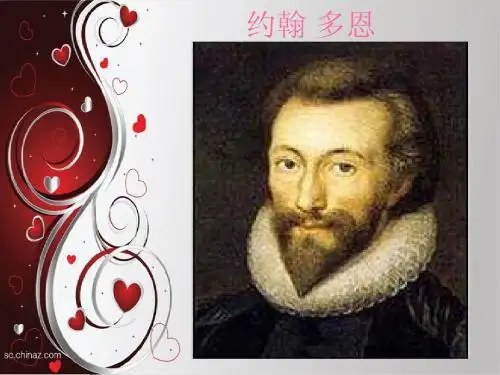
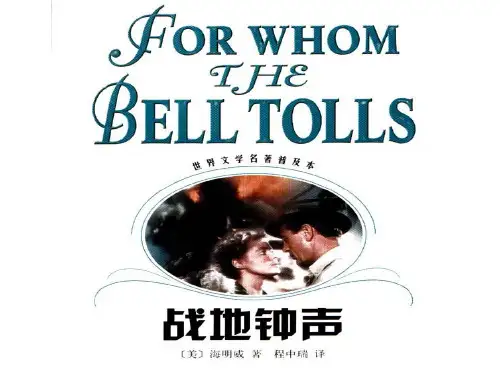
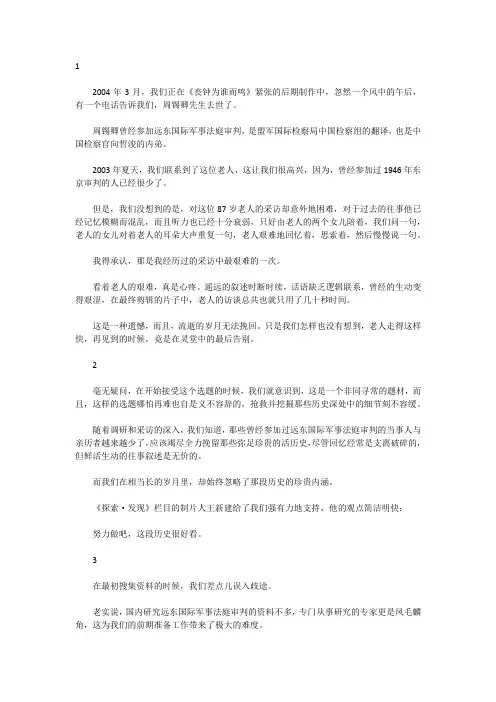
2004年3月,我们正在《丧钟为谁而鸣》紧张的后期制作中,忽然一个风中的午后,有一个电话告诉我们,周锡卿先生去世了。
周锡卿曾经参加远东国际军事法庭审判,是盟军国际检察局中国检察组的翻译,也是中国检察官向哲浚的内弟。
2003年夏天,我们联系到了这位老人,这让我们很高兴,因为,曾经参加过1946年东京审判的人已经很少了。
但是,我们没想到的是,对这位87岁老人的采访却意外地困难,对于过去的往事他已经记忆模糊而混乱,而且听力也已经十分衰弱,只好由老人的两个女儿陪着,我们问一句,老人的女儿对着老人的耳朵大声重复一句,老人艰难地回忆着,思索着,然后慢慢说一句。
我得承认,那是我经历过的采访中最艰难的一次。
看着老人的艰难,真是心疼。
遥远的叙述时断时续,话语缺乏逻辑联系,曾经的生动变得艰涩,在最终剪辑的片子中,老人的访谈总共也就只用了几十秒时间。
这是一种遗憾,而且,流逝的岁月无法挽回。
只是我们怎样也没有想到,老人走得这样快,再见到的时候,竟是在灵堂中的最后告别。
2毫无疑问,在开始接受这个选题的时候,我们就意识到,这是一个非同寻常的题材,而且,这样的选题哪怕再难也自是义不容辞的,抢救并挖掘那些历史深处中的细节刻不容缓。
随着调研和采访的深入,我们知道,那些曾经参加过远东国际军事法庭审判的当事人与亲历者越来越少了,应该竭尽全力挽留那些弥足珍贵的活历史,尽管回忆经常是支离破碎的,但鲜活生动的往事叙述是无价的。
而我们在相当长的岁月里,却始终忽略了那段历史的珍贵内涵。
《探索·发现》栏目的制片人王新建给了我们强有力地支持,他的观点简洁明快:努力做吧,这段历史很好看。
3在最初搜集资料的时候,我们差点儿误入歧途。
老实说,国内研究远东国际军事法庭审判的资料不多,专门从事研究的专家更是凤毛麟角,这为我们的前期准备工作带来了极大的难度。
有一天,编导张焰忽然兴奋不已地冲进办公室,手里挥舞着一本刚刚出版的书说,找到了!找到了!是一本描写有关东京审判的书。
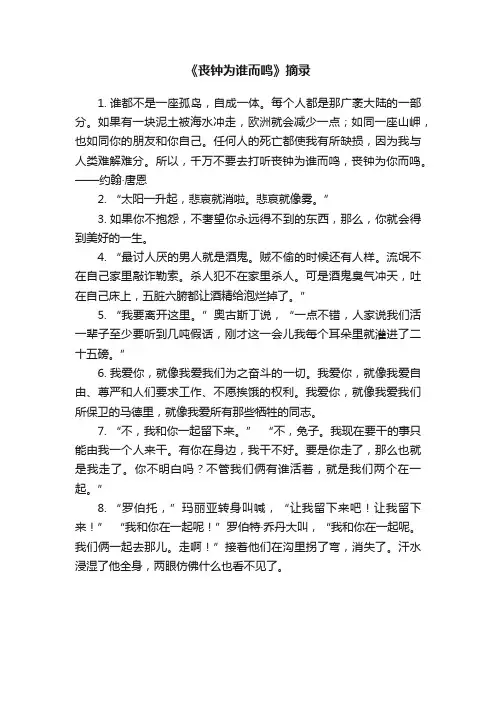
《丧钟为谁而鸣》摘录1.谁都不是一座孤岛,自成一体。
每个人都是那广袤大陆的一部分。
如果有一块泥土被海水冲走,欧洲就会减少一点;如同一座山岬,也如同你的朋友和你自己。
任何人的死亡都使我有所缺损,因为我与人类难解难分。
所以,千万不要去打听丧钟为谁而鸣,丧钟为你而鸣。
——约翰·唐恩2.“太阳一升起,悲哀就消啦。
悲哀就像雾。
”3.如果你不抱怨,不奢望你永远得不到的东西,那么,你就会得到美好的一生。
4.“最讨人厌的男人就是酒鬼。
贼不偷的时候还有人样。
流氓不在自己家里敲诈勒索。
杀人犯不在家里杀人。
可是酒鬼臭气冲天,吐在自己床上,五脏六腑都让酒精给泡烂掉了。
”5.“我要离开这里。
”奥古斯丁说,“一点不错,人家说我们活一辈子至少要听到几吨假话,刚才这一会儿我毎个耳朵里就灌进了二十五磅。
”6.我爱你,就像我爱我们为之奋斗的一切。
我爱你,就像我爱自由、尊严和人们要求工作、不愿挨饿的权利。
我爱你,就像我爱我们所保卫的马德里,就像我爱所有那些牺牲的同志。
7.“不,我和你一起留下来。
” “不,兔子。
我现在要干的事只能由我一个人来干。
有你在身边,我干不好。
要是你走了,那么也就是我走了。
你不明白吗?不管我们俩有谁活着,就是我们两个在一起。
”8.“罗伯托,”玛丽亚转身叫喊,“让我留下来吧!让我留下来!” “我和你在一起呢!”罗伯特·乔丹大叫,“我和你在一起呢。
我们俩一起去那儿。
走啊!”接着他们在沟里拐了弯,消失了。
汗水浸湿了他全身,两眼仿佛什么也看不见了。
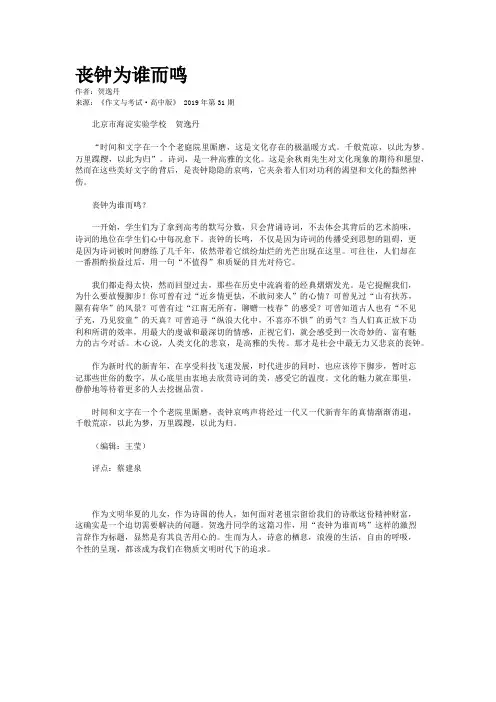
丧钟为谁而鸣作者:贺逸丹来源:《作文与考试·高中版》 2019年第31期北京市海淀实验学校贺逸丹“时间和文字在一个个老庭院里厮磨,这是文化存在的极温暖方式。
千般荒凉,以此为梦。
万里蹀躞,以此为归”。
诗词,是一种高雅的文化。
这是余秋雨先生对文化现象的期待和愿望,然而在这些美好文字的背后,是丧钟隐隐的哀鸣,它夹杂着人们对功利的渴望和文化的黯然神伤。
丧钟为谁而鸣?一开始,学生们为了拿到高考的默写分数,只会背诵诗词,不去体会其背后的艺术韵味,诗词的地位在学生们心中每况愈下。
丧钟的长鸣,不仅是因为诗词的传播受到思想的阻碍,更是因为诗词被时间磨练了几千年,依然带着它缤纷灿烂的光芒出现在这里。
可往往,人们却在一番斟酌损益过后,用一句“不值得”和质疑的目光对待它。
我们都走得太快,然而回望过去,那些在历史中流淌着的经典熠熠发光。
是它提醒我们,为什么要放慢脚步!你可曾有过“近乡情更怯,不敢问来人”的心情?可曾见过“山有扶苏,隰有荷华”的风景?可曾有过“江南无所有,聊赠一枝春”的感受?可曾知道古人也有“不见子充,乃见狡童”的天真?可曾追寻“纵浪大化中,不喜亦不惧”的勇气?当人们真正放下功利和所谓的效率,用最大的虔诚和最深切的情感,正视它们,就会感受到一次奇妙的、富有魅力的古今对话。
木心说,人类文化的悲哀,是高雅的失传。
那才是社会中最无力又悲哀的丧钟。
作为新时代的新青年,在享受科技飞速发展,时代进步的同时,也应该停下脚步,暂时忘记那些世俗的数字,从心底里由衷地去欣赏诗词的美,感受它的温度。
文化的魅力就在那里,静静地等待着更多的人去挖掘品赏。
时间和文字在一个个老院里厮磨,丧钟哀鸣声将经过一代又一代新青年的真情渐渐消退,千般荒凉,以此为梦,万里蹀躞,以此为归。
(编辑:王莹)评点:蔡建泉作为文明华夏的儿女,作为诗国的传人,如何面对老祖宗留给我们的诗歌这份精神财富,这确实是一个迫切需要解决的问题。
贺逸丹同学的这篇习作,用“丧钟为谁而鸣”这样的激烈言辞作为标题,显然是有其良苦用心的。
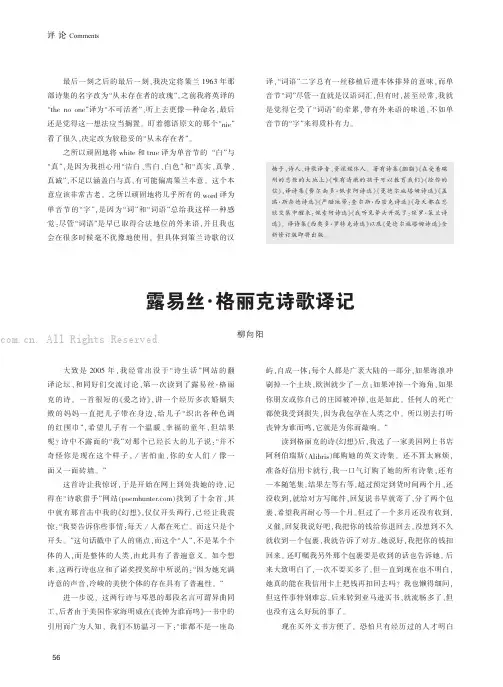
杨子,诗人、诗歌译者、资深媒体人。
著有诗集《胭脂》《在受着磔刑的悲怆的大地上》《唯有清澈的孩子可以教育我们》《给你的信》,译诗集《费尔南多·佩索阿诗选》《曼德尔施塔姆诗选》《盖瑞·斯奈德诗选》《严酷地带:查尔斯·西密克诗选》《每天都在悲欣交集中醒来:佩索阿诗选》《我听见斧头开花了:保罗·策兰诗选》。
译诗集《西奥多·罗特克诗选》以及《曼德尔施塔姆诗选》全新修订版即将出版。
评论Comments露易丝·格丽克诗歌译记柳向阳最后一刻之后的最后一刻,我决定将策兰1963年那部诗集的名字改为“从未存在者的玫瑰”。
之前我将英译的“the no one ”译为“不可活者”,听上去更像一种命名,最后还是觉得这一想法应当搁置。
盯着德语原文的那个“nie ”看了很久,决定改为较稳妥的“从未存在者”。
之所以顽固地将white 和true 译为单音节的“白”与“真”,是因为我担心用“洁白、雪白、白色”和“真实、真挚、真诚”,不足以涵盖白与真,有可能偏离策兰本意。
这个本意应该非常古老。
之所以顽固地将几乎所有的word 译为单音节的“字”,是因为“词”和“词语”总给我这样一种感觉:尽管“词语”是早已取得合法地位的外来语,并且我也会在很多时候毫不犹豫地使用,但具体到策兰诗歌的汉译,“词语”二字总有一丝移植后遭本体排异的意味,而单音节“词”尽管一直就是汉语词汇,但有时,甚至经常,我就是觉得它受了“词语”的牵累,带有外来语的味道,不如单音节的“字”来得质朴有力。
大致是2005年,我经常出没于“诗生活”网站的翻译论坛,和同好们交流讨论,第一次读到了露易丝·格丽克的诗。
一首很短的《爱之诗》,讲一个经历多次婚姻失败的妈妈一直把儿子带在身边,给儿子“织出各种色调的红围巾”,希望儿子有一个温暖、幸福的童年,但结果呢?诗中不露面的“我”对那个已经长大的儿子说:“并不奇怪你是现在这个样子,∕害怕血,你的女人们∕像一面又一面砖墙。
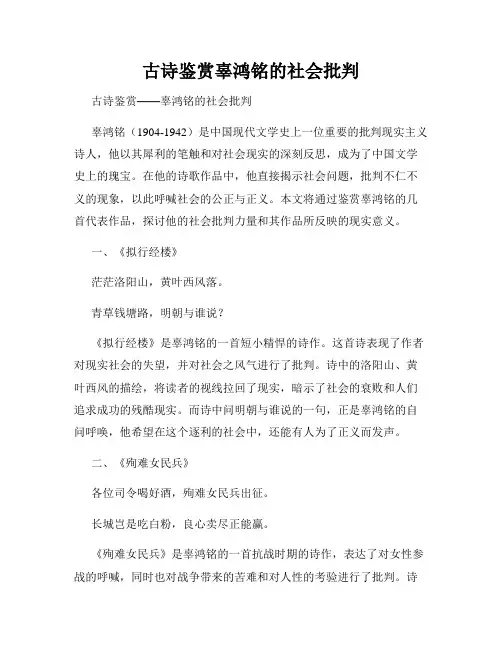
古诗鉴赏辜鸿铭的社会批判古诗鉴赏——辜鸿铭的社会批判辜鸿铭(1904-1942)是中国现代文学史上一位重要的批判现实主义诗人,他以其犀利的笔触和对社会现实的深刻反思,成为了中国文学史上的瑰宝。
在他的诗歌作品中,他直接揭示社会问题,批判不仁不义的现象,以此呼喊社会的公正与正义。
本文将通过鉴赏辜鸿铭的几首代表作品,探讨他的社会批判力量和其作品所反映的现实意义。
一、《拟行经楼》茫茫洛阳山,黄叶西风落。
青草钱塘路,明朝与谁说?《拟行经楼》是辜鸿铭的一首短小精悍的诗作。
这首诗表现了作者对现实社会的失望,并对社会之风气进行了批判。
诗中的洛阳山、黄叶西风的描绘,将读者的视线拉回了现实,暗示了社会的衰败和人们追求成功的残酷现实。
而诗中问明朝与谁说的一句,正是辜鸿铭的自问呼唤,他希望在这个逐利的社会中,还能有人为了正义而发声。
二、《殉难女民兵》各位司令喝好酒,殉难女民兵出征。
长城岂是吃白粉,良心卖尽正能赢。
《殉难女民兵》是辜鸿铭的一首抗战时期的诗作,表达了对女性参战的呼喊,同时也对战争带来的苦难和对人性的考验进行了批判。
诗中的各位司令喝好酒,展示了战争背后权贵们的阴谋和无动于衷的态度;而长城岂是吃白粉一句,则指出了战争的残酷和无良的商业利益,呼吁人们保持良心,追求正义。
三、《丧钟为谁而鸣》看那高原上的丧钟为谁在鸣!是神灵还是司令,是黄金还是清贫?财主在买买买,单手拇指微微动弹。
而丧钟在为国家、民族在鸣!《丧钟为谁而鸣》是辜鸿铭的一首具有强烈社会批判色彩的诗作。
诗中通过丧钟引发了作者对社会状态的质疑,表现出对现实社会的愤懑和鞭挞。
财主的“买买买”和“单手拇指微微动弹”,形象地描绘了贪婪的商人和无视社会公义的现象。
而诗中的丧钟则代表着国家、民族的悲伤和呼唤。
四、《抗战信天山》天山奇景路未通,望月怀愁哭奇冤。
蹄声震地明刚柔,血海波澜风风烈。
蜿蜒起伏的羊肠路,白骨横七的黑角山。
《抗战信天山》是辜鸿铭的一首揭示社会黑暗面的战争诗作,通过对信天山战争的描绘,作者批判战争给人民带来的苦难和伤痛。
约翰·多恩著《丧钟为谁而鸣》强烈推荐:约翰·多恩著《丧钟为谁而鸣》———生死边缘的沉思录Devotions upon Emergent Occasions[英] 约翰·多恩著林和生译一部被引用最多,却少有人读过的经典名著,第一个中文译本思考人类处境,在与上帝的对话中自我勉励,紧急时刻的祈祷读者对象:哲学、心理学和诗歌爱好者以及关心人生、命运与信仰等问题的读者。
本书特点:1本书是伟大诗人和圣公会主教多恩最具代表性的作品,书中收录的二十三篇紧急时刻的祷告,其中每一篇包括“思考”“自我勉励”“祷告”三部分,本书在西方神学、心理学和诗歌著作中具有极高地位,思想深刻,影响深远。
2本书具有极为重要的心理学价值,细致入微地分析了病人的心理特征。
3书中配有英国浪漫主义诗人威廉·布莱克的经典插画,绝对值得珍藏。
内容简介:约翰•多恩,莎士比亚和弗朗西斯•培根的同时代英国同胞。
他的文字和思想与他们一样对17世纪和20世纪的作家影响巨大。
在信仰之内,多恩是追随和仿效耶稣的圣徒;在信仰之外,他是传承和发扬文学和文化遗产的大师。
1623年,多恩因罹染瘟疫而陷于生死未卜、凶多吉少的绝境。
按常理,他将被巨大的恐惧压倒,日常生活一塌糊涂,然而,凭借纯金般的信仰,恪守“尽心、尽性、尽意爱主”以及“爱人如己”的诫命,多恩不仅没被瘟疫所“阉割”,反而写下二十三篇“紧急时刻的祷告”(即本书),这一组历史性的辉煌文献。
其中包含了那段著名的感念:没有人是独自存在的岛屿;每个人都是大地的一部分;如果海流冲走一团泥土,大陆就失去了一块,如同失去一个海岬,如同朋友或自己失去家园:任何人的死都让我蒙受损失,因为我与人类息息相关;因此,别去打听钟声为谁而鸣,它为你鸣。
最新英语专业全英原创毕业论文,都是近期写作1 美狄亚的女性主义分析2 浅析中西方饮食文化差异—比较“春节”和“圣诞节”3 《最蓝的眼睛》的叙述声音和视角4 浅析英语习语的翻译原则和方法5 书面语言输入与输出对英语词汇习得的影响6 浅析《儿子与情人》的人物刻画的技巧7 文化碰撞和融合——探讨少数裔文化在美国主流文化下的生存8 跨文化交际中旅游英语菜式的翻译9 中英道歉语的比较分析10 试论任务型教学法在英语阅读教学中的应用11 对《儿子与情人》中女性形象的分析12 《新成长的烦恼》影视字幕中文化负载词的英汉翻译策略13 小学英语语法任务式教学14 元认知策略在高中英语写作教学中的运用15 文档所公布均英语专业全英原创毕业论文。
原创Q 805 990 74 916 论《霍华德庄园》中的象征主义17 教师在英语自主学习中的作用18 中餐菜谱翻译的错误分析19 论《一个温和的建议》中的黑色幽默20 “美国梦”的再探讨—以《推销员之死》为例21 《老人与海》的悲剧色彩:对完美主义的质疑22 《哈利波特》系列小说的浪漫主义情节分析23 A Pragmatic Analysis of Oxymoron in Advertising24 王尔德童话《夜莺与玫瑰》中的唯美主义25 试论爱伦•坡的作品在当时遭受非议的必然性26 合作原则视角下中美情景喜剧中言语幽默的对比研究27 从《绝望主妇》对比中美女性家庭观28 从目的论看儿童文学翻译--兼评《小王子》中英译本29 分析内战对《飘》中斯佳丽的影响30 对罗伯特•弗罗斯特自然诗的尝试性研究31 对《红字》中丁梅斯代尔的心理分析32 从《宠儿》透视美国黑人女性的悲剧33 名词化隐喻在外贸函电中的功能分析34 侠客精神和骑士精神折射出的文化差异—《七侠五义》和《亚瑟王之死》之比较35 论《飘》与《傲慢与偏见》中女性追求幸福的不同方式36 The Influences of RMB Appreciation on China’s Foreign Trade37 从跨文化视角看文化定势及偏见在非言语交际中的影响38 勃朗特两姐妹创作风格差异探究39 美剧字幕中的译者主体性——以美剧Gossip Girl第一季为例40 《洛丽塔》悲剧结局因素探析41 Different Cultural Connotations of Animal glossaries in Chinese and English42 游戏在小学低年级英语教学中的应用43 英语委婉语的文化内涵及汉译策略44 商务谈判中幽默语的运用45 浅析《白牙》中爱的力量46 广告英语及其翻译47 《傲慢与偏见》中的对立与统一48 On the Ways to Develop Junior Middle School Students’Autonomous Ability49 A Comparison and Contrast between Works by Byron and Shelley50 《喧哗与骚动》中凯蒂悲剧的分析51 浅析法律英语的词汇特点及其翻译52 文化差异对英汉翻译的影响53 任务型教学中策划对高级英语学习者写作任务完成效果的影响54 艾米莉狄金森死亡诗歌的解读55 论《家》和《儿女一箩筐》中的中美家庭文化差异56 中西方餐桌礼仪的文化对比分析57 《白鲸》原型批判的分析58 英汉称呼语的对比研究59 英语中的一词多义现象60 《智血》中主要人物生命历程解读(开题报告+论)61 论《月亮宝石》的现实主义手法62 英汉动物词汇文化内涵对比63 礼貌原则框架下化妆品广告语篇研究64 从女性主义角度分析阿加莎克里斯蒂的主要作品65 由《克莱默夫妇》思考美国女权运动对美国家庭的影响66 寻找自我——从女性意识角度解读《觉醒》67 英汉颜色词“红”与“白”的文化内涵研究68 论《了不起的盖茨比》中的象征及其作用69 中美商务礼仪差异的跨文化解析70 《简爱》的特征—一位独立的女性71 广告英语的语言特色72 对《卡斯特桥市长》主人公亨查德矛盾性格的分析73 探讨《根》中黑人与美国人的根74 伊恩•麦克尤恩《时间中的孩子》中斯蒂芬的心理创伤和恢复分析75 《论语》中“孝”的英译——基于《论语》两个英译本的对比研究76 看《一间自己的屋子》中弗吉尼亚伍尔夫的女性主义思想77 《飘》中斯嘉丽的生活态度78 对跨文化交际中肢体语言的研究79 目的论在英文电影片名汉译中的应用80 《老人与海》的象征意义分析81 《麦琪的礼物》看语境在中英翻译中的影响82 华尔华兹《我似一朵流云独自漂浮》中的自然观83 中国时政新词翻译探析84 A Brief Study of Rhetorical Devices Employed in President Obama’s Inaugural Address--from the Perspective of Syntactic Structure85 《占有》中维多利亚时代女权主义者的爱情观分析86 The Interpretation to Captain Ahab in Moby Dick through Abnormal Psychology87 A Study on Intercultural Communication of American TV Series88 你是爱丽丝吗?从《爱丽丝梦游仙境》中人物看作者刘易斯.卡罗尔的写作意图89 迷惘一代的英雄:厄内斯特海明威与弗雷德里克亨利90 宗教在世界战争史中扮演的角色91 从概念整合视角解读《老友记》中的言语幽默92 从福柯的后人道主义视角看赫尔米娜之死——解读赫尔曼黑塞作品《荒原狼》93 论简奥斯丁在《傲慢与偏见》中的女性意识和婚姻观94 广告翻译95 《闻香识女人》角色分析96 《麦田里的守望者》中霍尔顿的性格分析97 浅析詹姆斯•乔伊斯《一个青年艺术家的画像》的成长主题98 《紫颜色》中爱丽斯沃克妇女主义解读99 从美学角度浅谈英文电影片名的翻译100 解析《永别了,武器》中亨利的人物形象101 法律英语词汇的特点及其翻译102 论英汉谚语的起源差异103 从目的论看电影《音乐之声》中对白的汉译104 从语用角度谈英汉称赞语及其回应策略105 角色中体现的悲剧主题——《榆树下的欲望》与《雷雨》之对比分析106 由中国的圣诞节“热”来看中美文化的冲突及融合107 女性哥特视角下的《蝴蝶梦》108 谈品牌广告文体特点及其翻译109 中美大学创业教育的比较和启示110 奉献与救赎:浅谈欧•亨利小说的宗教精神111 商务信函中委婉语的使用策略112 英语反语的语用分析113 论奥斯丁女性主义观点在《爱玛》中的体现114 女性意识的苏醒--对《愤怒的葡萄》中的约德妈妈形象的分析115 爱与孤独的互生——舍伍德安德森《曾经沧海》与戴维劳伦斯《马贩子的女儿》对比研究116 广告中的文化差异及翻译策略117 《汤姆·索亚历险记》中所反映的社会问题118 图式在英语阅读中的作用119 《收藏家》中空间与人物心理关系的解读120 从《马拉喀什》和《射象》看乔治•奥威尔散文的艺术风格121 英汉植物文化词汇的差异及翻译研究122 简爱——平凡而非凡的女人123 A Study of the Characters and Their Influence on the Hero of The Catcher in the Rye124 《我的安东妮娅》中的文化冲突研究125 从《纯真年代》的女性角色看旧纽约的女性地位126 模因论视角下的中国网络新词翻译策略127 大学英语课堂互动的实证研究128 《红楼梦》饮食词语英译策略探析129 爱米丽的悲剧成因—评福克纳的小说《献给爱米丽的一朵玫瑰花》130 顺应理论视角下公益广告英译中的语用失误分析131 On the C-E Translation of Public Signs132 《卡拉维拉斯县驰名的跳蛙》中的幽默133 论中美商务谈判中的跨文化交际因素134 论不同语境下广告语中双关语的翻译原则135 《傲慢与偏见》中话语标记语的语用推理研究136 试析爱丽丝沃克作品中的女性主义观点——以《紫色》为例137 英汉谚语的文化对比分析138 An Application of Schema Theory in Interpreting139 语法翻译法与交际法的对比研究140 英语语言中性别歧视的社会语言学视角141 The Alternation of Language: A Study of Microblogging V ocabulary142 关于农村初中生在英语课堂教学中注意力的调查研究143 别样的美丽——析《厄舍古屋的倒塌》中无处不在的哥特式风格144 英雄精神的回归—浅析《雨王汉德森》的主题145 超越和世俗——对《月亮和六便士》中Strickland和Stroeve的对比分析146 英语写作中的母语迁移作用及教学启示147 小说《鲁滨逊漂流记》中的精神力量分析148 《哈克贝利•费恩历险记》的艺术特色分析149 中美学校教育和家庭教育之比较150 浅析华兹华斯诗歌中的自然观151 任务型教学法在高中英语阅读中的使用初探152 论《儿子与情人》中“花”的象征意义153 功能对等理论下罗慕士《三国演义》英译本成语翻译研究154 《最蓝的眼睛》中美国黑人小女孩所承受的三重歧视155 影响中学生英语学习的心理因素分析156 外来词的翻译方法初探157 浅析好莱坞英雄主义中的传统英雄和反英雄形象158 王尔德童话中的美学观和内在矛盾159 论凯特肖班《觉醒》中的超验思想160 浅析《儿子与情人》中扭曲的人物关系161 论标示语汉英翻译中的等效问题162 “自我”的迷失与重构:论卡勒德•胡塞尼《追风筝的人》(开题报告+论文) 163 Effects of First Person Narration on Thematic Expression in Araby164 浅谈礼仪在商务谈判中的重要性及其相关策略165 通过苔丝透析托马斯•哈代的现代女性意识166 《吉姆爷》的生态女性主义解读167 从《道连•格雷的画像》透析王尔德的艺术人生观168 A Comparison of the English Color Terms169 Memory Theories and Their Applications to English V ocabulary Learning170 劳伦斯小说中的女性形象171 艾米丽·勃朗特《呼啸山庄》中男主人公希斯克利夫的形象分析172 从才能选秀看中西方梦想观念的异同173 科学家的困惑——从生态伦理角度浅析《弗兰肯斯坦》174 学习动机对大学生英语学习的影响175 论文化背景对跨文化英语口语交际效果的影响176 从产品说明书的英译错误分析探讨其翻译策略177 《看不见的人》主题分析178 多媒体英语教学的优势与劣势179 杰克·伦敦作品《海狼》中海狼命运的解读180 模糊限制语在求职中的应用研究181 A Comparison of the English Color Terms182 自我效能感理论对中学英语教学的启示183 从认知角度比较英日语言的空间隐喻184 教师角色的转变与高中生英语自主学习能力的提高185 论概念隐喻视角下的隐喻翻译186 浅析国际商务谈判成功之道187 试论《武林外传》与《老友记》中的中美文化差异188 Cooperative Principle in Business Letters189 教师身势语在英语口语教学中的应用190 从文化角度看英汉习语翻译191 中式英语成因之分析192 英汉禁忌语对比分析193 试析英语广告中双关语的翻译194 从《道连•格雷的画像》看唯美主义195 《老人与海》中的孤独196 从礼仪角度谈中西文化的差异性197 海明威的“冰山原则”与其短篇小说的人物对话198 The Analysis of Promotion Strategy of L’Oréal in China 199 《芒果街上的小屋》中窗户意象的分析200 论英语课堂有效提问的策略。
ContextErnest hemingway was born in 1899 in a wealthy, conservative Chicago suburb. The second of six children, he showed an early talent in writing that he honed through work on his high school’s literary magazine and student newspaper. Upon graduating f rom high school in 1917, Hemingway moved away from home and embarked on a professional writing career, starting as a reporter for the Kansas City Star.In 1918, during the height of World War I, Hemingway volunteered to serve as an ambulance driver for the Red Cross, which sent him to Italy. Within just a few weeks of his arrival, Hemingway was injured by an exploding shell and was sent to a hospital in Milan. During his recovery, he became romantically involved with a nurse—an episode that he portrayed years later in his novel A Farewell to Arms (1929).After the war, Hemingway worked as a newspaper correspondent in Paris, where he moved among a circle of expatriate artists and writers, including American writers F. Scott Fitzgerald and Gertrude Stein, Irish writer James Joyce, and Spanish painter Pablo Picasso. Stein, in particular, became Hemingway’s mentor. Some critics have suggested that she provided the inspiration for the character Pilar in For Whom the Bel l Tolls, who serves as a mother figure for the protagonist, Robert Jordan.During his time as a correspondent, Hemingway traveled extensively in Spain and developed a strong interest in Spanish culture. He became especially interested in bullfighting, which he viewed as a uniquely Spanish experience that accustomed Spaniards to face death and thus enabled them to live fuller lives. Hemingway’s interest in Spain led to literary masterpieces such as The Sun Also Rises (1926), a ch ronicle of a group of disaffected Americans in postwar France and Spain, and Death in the Afternoon (1932), a nonfiction work about bullfighting.For Whom the Bell Tolls (1940) takes place during the Spanish Civil War, which ravaged the country throughout the late 1930s. Tensions in Spain began to rise as early as 1931, when a group of left-wing Republicans overthrew the country’s monarchy in a bloodless coup. The new Republican government then proposed controversial religious reforms that angered right-wing Fascists, who had the support of the army and the Catholic church.After a strong Communist turnout in the 1936 popular elections, the Fascist army commander Generalísimo Francisco Franco initiated a coup in an attempt to overthrow the Republican government. Unexpectedly, the key cities of Madrid and Barcelona remained loyal to the Republic. This divide marked the beginning of the Spanish Civil War, a conflict between the right-wing Fascists (Nationalists) and the left-wing Republicans (Loyalists), a large number of whom were Communists. Violence exploded all over Spain, and both sides committed atrocities. Many western countries saw the Spanish Civil War as a symbolic struggle between fascism and democracy. Eventually, the superior military machine of the Fascist alliance prevailed, and the war ended in the spring of 1939.During the Spanish Civil War, Hemingway was involved in the production of two Loyalist propaganda documentary films. Later in the conflict, he served as a war correspondent for the North American Newspaper Alliance. For Whom the Bell Tolls expresses Hemingwa y’s strong feelings about the war, both a critique of the Republicans’ leadership and a lament over the Fascists’ destruction of the earthy way o f life of the Spanish peasantry. The novel is set in the spring of 1937, at a time when the war had come to a standstill, a month after German troops razed the Spanish town of Guernica. At this point, the Republicans still held out some hope for victory and were planning a new offensive. For Whom the Bell Tolls explores themes of wartime individuality, the effects of war on its combatants, and the military bureaucracy’s impersonal indifference to human life. Most important, the novel addresses the question of whether an idealistic view of the world justifies violence.Hemingway’s novels are known for portraying a particular type of hero. Critic Philip Young famously termed this figure a ―code hero,‖ a man who gracefully struggles against death and obliteration. Robert Jordan, the protagonist of For Whom the Bell Tolls, is a prime example of this kind of hero. The tragedy of the code hero is that he is mortal and knows that he will ultimately lose the struggle. Meanwhile, he lives according to a code—hence the term code hero—that helps him endure a life full of stress and tension with courage and grace. He appreciates the physical pleasures of this world—food, drink, sex, and so on—without obsessing over them.Hemingway is particularly known for his journalistic prose style, which was revolutionary at the time and has influenced countless writers since. Hemingway’s wr iting is succinct and direct, although his speakers tend to give the impression that they are leaving a tremendous amount unsaid. This bold experimentation with prose earned Hemingway the 1953 Pulitzer Prize and 1954 Nobel Prize for Literature for his most popular work, the novella The Old Man and the Sea (1952).Although Hemingway wrote several more novels afterward, he was never again able to match the success of The Old Man and the Sea. In the late 1950s, the combination of depression, deteriorating health, and frustration with his writing began to weigh heavily on him. His depression worsened, and in July 1961, he died of a self-inflicted gunshot wound in Ketchum, Idaho. Although Hemingway’s long career ended sadly, his novels and short stories remain as popular today as ever before, and he maintains a reputation as one of the most innovative and influential authors of the twentieth century.Shopping Cart 0 items CheckoutPlot OverviewFor Whom The Bell Tolls opens in May 1937, at the height of the Spanish Civil War. An American man named Robert Jordan, who has left the United States to enlist on the Republican side in the war, travels behind enemy lines to work with Spanish guerrilla fighters, or guerrilleros, hiding in the mountains. The Republican command has assigned Robert Jordan the dangerous and difficult task of blowing up a Fascist-controlled bridge as part of a larger Republican offensive.A peasant named Anselmo guides Robert Jordan to the guerrilla camp, which is hidden in a cave. Along the way, they encounter Pablo, the leader of the camp, who greets Robert Jordan with hostility and opposes the bridge operation because he believes it endangers the gu errilleros’ safety. Robert Jordan suspects that Pablo may betray or sabotage the mission.At the camp, Robert Jordan meets Pilar, Pablo’s ―woman.‖ A large, sturdy part-gypsy, Pilar appears to be the real leader of the band of guerrilleros. A rapport quickly develops between Robert Jordan and Pilar. During the course of the evening, Robert Jordan meets the six other inhabitants of the camp: the unreliable Rafael, feisty and foul-mouthed Agustín, dignified Fernando, old Primitivo, and brothers Andrés and Eladio. The camp also shelters a young woman named Maria, whom a band of Fascists raped not long before. Robert Jordan and Maria are immediately drawn to each other.Robert Jordan and Anselmo leave the camp to scout out the bridge. When they return, Pablo publicly announces that neither he nor his guerrilleros will help blow up the bridge. Pilar and the others disagree, however, so Pablo sullenly gives in. Privately, Rafael urges Robert Jordan to kill Pablo, but Pilar insists that Pablo is not dangerous. That night, Maria comes out to join Robert Jordan as he sleeps outside. They profess love for each other and make love.The next morning, Pilar leads Robert Jordan through the forest to consult with El Sordo, the leader of another band of guerrilleros, about the bridge operation. They take Maria along. El Sordo agrees to help with the mission, but both he and Robert Jordan are troubled by the fact that the bridge must be blown in daylight, which will make their retreat more difficult. On the way back to Pablo’s camp, Robert Jorda n and Maria make love in the forest. When they catch up with Pilar, Maria confesses to Pilar that the earth moved as they made love. Pilar, impressed, says that such a thinghappens no more than three times in a person’s lifetime.Back at the camp, a drunken Pablo insults Robert Jordan, who tries to provoke Pablo, hoping to find an excuse to kill him. Pablo refuses to be provoked, even when Agustín hits him in the face. When Pablo steps away for a few minutes, the others agree that he is dangerous and must be killed. Robert Jordan volunteers to do it. Suddenly, Pablo returns and announces that he has changed his mind and will help with the bridge. Later that night, Maria comes outside to sleep with Robert Jordan again. They talk about their feeling that they are one person, that they share the same body.In the morning, Robert Jordan wakes up, sees a Fascist cavalryman, and shoots him, awakening the camp. After breakfast, the group hears sounds of a fight in the distance, and Robert Jordan believes that the Fascists are attacking El Sordo’s camp. Agustín and Primitivo wa nt to aid El Sordo, but Robert Jordan and Pilar know that it likely would be useless.The scene shifts to El Sordo’s hill, which a group of Fascists is assaulting. El Sordo’s men play dead and manage to shoot th e Fascist captain, but several minutes later, Fas cist planes bomb the hilltop and kill everyone in El Sordo’s band. The ranking Fascist officer orders the beheading of all the corpses of El Sordo’s men.The guerrilleros at Pablo’s camp, having heard the planes bomb El Sordo’s hill, feel glum as they eat lunch. Robert Jordan writes a dispatch to the Republican command recommending that both the bridge operation and the larger offensive be canceled, for the Fascists are aware of the plan and the operation will not succeed. He sends Andrés to deliver the dispatch to the headquarters of General Golz, a Republican leader. Maria again joins Robert Jordan in his sleeping bag that night, and they fantasize about their future life in Madrid.Meanwhile, in Madrid, Robert Jordan’s friend, a Russian journalist named K arkov, learns that the Fascists know about the offensive the Republicans have planned for the next day. Karkov worries about Robert Jordan.At two in the morning, Pilar wakes Robert Jordan and reports that Pablo has fled the camp with some of the explosives that were meant to blow the bridge. Though furious at first, Robert Jordan controls his anger and plans to carry out the operation anyway, with fewer explosives. He wakes up Maria, and as they make love, they feel the earth move again. Pablo suddenly returns just before dawn, claiming that he left in a moment of weakness. He says that he threw the explosives into the river but felt great loneliness after doing so. He has brought back five men with their horses from neighboring guerrilla bands to help. The fighters take their positions.The scene shifts to Andrés, who has been traveling through the night to deliver Robert Jordan’s dispatch to General Golz. Cro ssing into Republican territory, Andrés is slowed when several suspicious but apathetic officers qu estion him. When Andrés and his escort finally near Golz’s headquarters, a politician named André Marty suspects that they are Fascist spies and orders them arrested. Robert Jordan’s f riend Karkov hears about the arrests and uses his influence to free the men. Robert Jordan’s dispatch finally reaches Golz but arrives too late. The Republican offensive already has begun and can no longer be stopped.As dawn breaks, Robert Jordan and Anselmo descend on the bridge, shoot the Fascist sentries, and plant the explosives. Pilar arrives and says that Eladio has been killed, while Fernando, fatally wounded, must be left behind. When Robert Jordan detonates the explosives, the bridge falls, but shrapnel from the blast strikes Anselmo and kills him. Pablo emerges from below, saying that all five of his men are dead. Agustín accuses Pablo of shooting the men for their horses, and Pablo does not deny it.As the group crosses the road in retreat, a Fascist bullet hits Robert Jordan’s horse, which tramples on Robert Jordan’s left leg, breaking it. Knowing that he must be left behind, Robert Jordan says goodbye to Maria, saying that he will be with her even if she goes. Pilar and Pablo lead Maria away.Alone, Robert Jordan contemplates suicide but resolves to stay alive to hold off the Fascists. He is grateful for having lived, in his final few days, a full lifetime. For the first time, he feels ―integrated,‖ in harmony with the world. As the Fascist lieutenant approa ches, Robert Jordan takes aim, feeling his heart beating against the floor of the forest.Character ListRobert Jordan - An American volunteer for the Republican side in the Spanish Civil War and the protagonist of For Whom the Bell Tolls. Robert Jordan is pragmatic, very good at what he does, and never lets his emotions interfere with his work. He appreciates physical pleasures like smelling pine trees, drinking absinthe, and having sex. At the same time, he is conflicted about his role within the war and within the larger world. Interior dialogues in which he argues with himself about these conflicts constitute a significant part of the novel. Over the course of the novel, he gradually resolves these tensions and learns to integrate his rational, thinking side with his intuitive, feeling side.Robert Jordan (In-Depth Analysis)Pablo - The leader of the guerrilla camp. Pablo is an individualist who feels responsible only to himself. Hemingway often compares him to a bull, a boar, and other burly, stubborn, and unpleasant animals. Pablo used to be a great fighter and a great man but has now started drinking and has ―gone bad,‖ as many characters remark. Tired of the war and attached to his horses, Pablo is ready to betray the Republican cause a t the start of the novel. Pablo (In-Depth Analysis)Pilar - Pablo’s par t-gypsy ―woman.‖ Pilar means ―pillar‖ in Spanish, and indeed, the fiercely patriotic, stocky, and steadfast Pilar is—if not the absolute leader—the support center of the guerrilla group. Pilar keeps the hearth, fights in battle, mothers Robert Jordan, and bullies Pablo and Rafael. She has an intuitive, mystical connection to deeper truths about the working of the world.Pilar (In-Depth Analysis)Maria - A young woman with Pablo’s band who falls in love with Robert Jordan. The victim of rape at the hands of Fascists who took over her town, Maria is frequently described by means of earth imagery. Hemingway compares her movements to a colt’s, and Robert Jordan affe ctionately calls her ―Rabbit.‖Maria (In-Depth Analysis)Anselmo - An old, trustworthy guerrilla fighter. For Robert Jordan, Anselmo represents all that is good about Spaniards. He lives close to the land, is loyal, follows directions, and stays where he is told. He likes to hunt but has not developed a taste for the kill and hates killing people. Anselmo has stopped praying ever since the Communists banned organized religion but admits that he misses it.Agustín - A trustworthy and high-spirited guerrilla fighter. Agustín, who mans the machine gun, curses frequently and is secretly in love with Maria. Fernando - A guerrilla fighter in his mid-thirties. Short and with a lazy eye, Fernando is dignified and literal-minded, embraces bureaucracy, and is easily offended by vulgarities. These factors, combined with his lack of a sense of humor, make Fernand o the frequent target of Pilar’s jokes. Primitivo - An elderly guerrilla fighter. Despite his gray hair and broken nose, Primitivo has not learned the cynicism needed for survival in the war. His name, which means ―primitive,‖ evokes his idealism as well as the basic, earthy lifestyle of all the guerrilleros.Rafael - A gypsy member of the guerrilla band. Frequently described as well-meaning but ―worthless,‖ Rafael proves his worthlessness by leaving his lookout post at a crucial moment. He is a foil for the trustworthy Anselmo, who does not leave his post on the previous night despite the cold and the snow. Rafael has few loyalties and does not believe in political causes.Andrés - One of the guerrilla fighters, in his late twenties. Andrés comes into con flict with the Republican leaders’ bureaucracy in his attempt todeliver Robert Jordan’s dispatch to the Republican command. Andrés serves also a foil to Pablo: although both Andrés and Pabl o enjoy killing in an almost sexual way, Andrés has had the opportunity to satisfy that thirst through his experience with bull-baiting during a town fiesta. As a result, unlike Pablo, Andrés has learned to identify and control his desire to kill.Eladio - Andrés’s older brother and another of the guerrilla fighters. The jumpy Eladio plays a relatively minor role in the novel. His most noticeable feature is that Robert Jordan repeatedly forgets his name. His death at the end of the novel attracts little notice.El Sordo (Santiago) - The leader of a guerrilla band that op erates near Pablo’s. Short, heavy, and gray-haired, El Sordo (Spanish for ―the deaf one‖) is a man of few words. Like Robert Jordan, he is excited by a successful kill and is sad to die.Joaquín - One of the members of El Sordo’s band. Joaquín originally wanted to be bullfighter but was too scared. He lost most of his family at the hands of the Fascists and cries when he talks about them. Joaquín buys into the Republicans’ propaganda but turns back to rel igion at the moment of his death, illustrating the emptiness of political rhetoric in times of true crisis.General Golz - The Russian general, allied with the Republicans, who assigns Robert Jordan the bridge-blowing mission. Robert Jordan says that Golz is the best general he has served under, but the R epublican military bureaucracy impedes all of Golz’s operations. Golz believes that thinking is useless because it breaks down resolve and impedes action.Kashkin - A Russian guerrilla operative who once worked with Pablo’s band to blow up a train. Althou gh Kashkin never appears in the novel, he is a foil for Robert Jordan. Unlike Robert Jordan, Kashkin was openly nervous.Karkov - A well-connected foreign correspondent for the Russian newspaper Pravda and Robert Jordan’s friend in Madrid. Karkov, the most intelligent man Robert Jordan knows, teaches Robert Jordan about the harsh realities of wartime politics. Karkov believes that abstract philosophy is superior to action and intuition.Captain Rogelio Gomez - A former barber and now commander of the battalion that Andrés first reaches after crossing the Republican lines. Gomez romanticizes the idea of guerrilla warfare and escorts Andrés to several commanders, trying to reach General Golz.Lieutenant-Colonel Miranda - A Republican staff office brigade co mmander. Miranda’s only goal in the war is not to be demoted from his current rank. He is one of many examples of apathetic or inept Republican commanders who contribute to the eventual Republican defeat.André Marty - The French Commissar of the International Brigades, the troops of foreign volunteers who serve on the Republican side in the war. Marty has become blinded by political paranoia and is convinced that he is surrounded by enemies.Lieutenant Paco Berrendo - A devoutly Catholic Fascist office r who orders the beheading of El Sordo’s men. Berrendo’s sorrow for his dead friend, his awareness of the useless horror of war, and his tendency toward introspection make him a sympathetic character. Hemingway’s portrayal of Berrendo underscores the fact that the enemy side is not faceless but composed of real individuals who also make real and difficult decisions. Captain Moro - An overconfident Fascist commander in charge of taking El Sordo’s hill. Moro serves as a foil for the more introspective Lieutenant Berrendo.Finito de Palencia - Pilar’s former lover, a bullfighter who died from complications from wounds received in a bullfight. Short, sad-eyed, and sullen, Finito was brave in the ring in spite of his fear of bulls. Finito, who appears in the n ovel only in Pilar’s flashbacks, exemplifies the courage of Hemingway’s code hero and Hemingway’s deep respect for the bullfighting profession.Robert Jordan’s father - A weak, religious man who could not stand up to his aggressive wife and eventually com mitted suicide. His father’s weakness is a constant source of embarrassment to Robert Jordan.Robert Jordan’s grandfather - A veteran of the American Civil War and a member of the Republican National Committee. Robert Jordan feels more closely related to his grandfather than to his father.Analysis of Major CharactersRobert JordanThe protagonist of For Whom the Bell Tolls, Robert Jordan left his job as a college instructor in the United States to volunteer for the Republican side in the Spanish Civil War. Initially, he believed in the Republican cause with a near-religious faith and felt an ―absolute brotherhood‖ with his comrades on the Republican side. However, when the action of the novel starts, we see that Robert Jordan has become disillusioned. As the conflict drags on, he realizes that he does not really believe in the Republican cause but joined their side simply because they fought against Fascism. Because he fights for a side whose causes he does not necessarily support, Robert Jordan experiences a great deal of internal conflict and begins to wonder whether there is really any difference between the Fascist and Republican sides.Robert Jordan’s interior monologues and actions indicate these internal conflicts that plague him. Although he is di sillusioned with the Republican cause, he continues to fight for that cause. In public he announces that he is anti-Fascist rather than a Communist, but in private he thinks that he has no politics at all. He knows that his job requires that he kill people but also knows that he should not believe in killing in the abstract. Despite his newfound love for Maria, he feels that there cannot be a place for her in his life while he also has his military work. He claims not to be superstitious but cannot stop thinking about the world as giving him signs of things to come. These conflicts weigh heavily on Robert Jordan throughout the bulk of the novel.Robert Jordan resolves these tensions at the end of For Whom the Bell Tolls, in his final moments as he faces death. He accepts himself as a man of action rather than thought, as a man who believes in practicality rather than abstract theories. He understands that the war requires him to do some things that he does not believe in. He also realizes that, though he cannot forget the unsavory deeds he has done in the past, he must avoid dwelling on them for the sake of getting things done in the present. Ultimately, Robert Jordan is able to make room in his mind for both his love for Maria and his military mission. By the end of the novel, just before he dies, his internal conflicts and tensions are resolved and he feels ―integrated‖ into the world.PabloPablo, the exasperating leader of the guerrilla band, is a complex character and an unpredictable force in the novel—a man who is difficult to like but ultimately difficult to condemn unwaveringly. Pablo and Robert Jordan view each other with mutual suspicion and dislike from the start: Pablo adamantly opposes the bridge operation and views Robert Jordan as a threat to the guerrilleros’ safety, while Robert Jordan senses that Pablo will betray the guerrilleros and sabotage the mission. Hemingway uses a variety of unflattering imagery to highlight Pablo’s uncoo perative and confrontational nature, often comparing Pablo to a bull, a boar, and other stubborn and unpleasant animals.In virtually all of his actions, Pablo displays a selfish lack of restraint, an irresponsible individualism that contrasts wi th Robert Jordan’s pragmatic and morally motivated outlook. Pablo rashly follows his impulses, whether in the cruel slaughter of the Fascists in his hometown or in the theft of Robert Jordan’s explosives. Although this self-indulgence made Pablo a strong and courageous fighter when he was younger, it now proves a liability, for it sows dissent within the guerrilla band and jeopardizes the mission. As Pilar says, Pablo once would have sacrificed anything for the Republican cause but has ―gone bad‖ as the war has dragged on and now wavers in his loyalties.Despite Pablo’s disagreeab le characteristics, however, he is not an evil man, and we cannot label him a villain. Although he is stubborn, rash, andsometimes brutal, Pablo displays a clear sense of conscience and realizes when he has done something wrong. He wishes he could bring back to life the Fascists he massacred in his town, and he characterizes his theft of Robert Jordan’s explosives as a ―moment of weakness.‖ At the same time, however, it is impossible to ignore the fact that Pablo feels remorse over a deed only after it’s t oo late to do anything about it. Above all, Pablo fears death and is exhausted with the war. He simply wants the war to end so that he may live a peaceful life in the country along with Pilar and his horses—a sentiment that is difficult to judge harshly. Ironically, it is Pablo, not Robert Jordan, who survives at the end of the novel. However, although Pablo stays alive, he does so without the moral strength that Robert Jordan maintains and develops throughout For Whom the Bell Tolls. PilarArguably the most colorful and likable character in For Whom the Bell Tolls, Pilar embodies the earthiness, strength, and wisdom of the Spanish peasantry. A large, robust, part-gypsy woman, Pilar exercises great influence over the band of guerrilleros—in fact, we quickly become aware that Pablo leads the band in name only. The strong and stable Pilar provides the motivating force behind many of the no vel’s events. She pushes Robert Jordan and Maria’s romance, commands the allegiance of the guerrilla fighters, and organizes the guerrilleros’ brief alliance with El Sordo. She acts as the support structure for the camp as she unites the band of guerrilla fighters into a family, cooks for a ll, and sews Robert Jordan’s packs. In short, Pilar manipulates the most important characters in For Whom the Bell Tolls and sets in place many of the encounters that drive the plot.Pilar, though practical, often relies on intuitive, mystical, gypsy folk wisdom. Shrewd and worldly-wise, she claims a deep connection to the primitive forces of fate. She claims to be able to smell death, and she describes the smell in repulsively naturalistic detail. She reads palms and interprets sexual experiences. Despite Robert Jordan’s cynicism, Pilar’s predictions do come true. Pilar exhibits the inevita ble sadness that comes with knowledge: ―Neither bull force nor bull courage lasted, she knew now, and what did last? I last. . . . But for what?‖ In the end, the only aspect of Pilar’s personality that seems not to show wisdom is her unswerving commitment to and belief in the Republican side, which ultimately loses the war.MariaThe young, gentle Maria catches Robert Jordan’s eye from the moment he meets her. She exudes a natural, glowing beauty, despi te the fact that she has recently suffered a traumatic rape and has had most of her hair shorn off. Though she is vulnerable and lays her emotions bare, she exhibits an inner strength, determination, and resilience that enable her to bear her difficult circumstances. Some critics contend that Hemingway intends Maria to represent the land of Spain itself, ravaged by the warring forces beyond her comprehension, yet always enduring, beautiful, and loving. Indeed, Hemingway frequently uses earth imagery to describe Maria, comparing her hair to the ―golden brown of a grain field‖ and her breasts to ―small hills.‖ In this light, Robert Jordan’s closeness with Maria mirrors his closeness with Spain, his adopted country.As Robert Jordan’s love interest, Maria provides the impetus for his personal development from an unfe eling thinker and doer to a romantic individual. In his conversations with General Golz and with Maria early in the novel, Robert Jordan reveals his belief that he does not have time for women during the war. Even after Robert meets Maria, he remains closed to extreme emotion or romance. Though in love with her, Robert Jordan still shuts her out whenever he must think about his work. However, by the end of the novel, Robert Jordan thanks Maria for everything that she has taught him and faces the day of his mission noting that he has integrated his commitments to work and to love. Maria, determined to embrace their love fully, teaches Robert Jordan how to resolve his tensions between love and work.Some critics of For Whom the Bell Tolls consider Maria a weak link in the novel because her characterization depends so heavily on the effect she has on Robert Jordan rather than on her own motivations and conflicts. These critics argue that Maria’s submissiveness and th e speed with which her affair with Robert Jordan progresses are unrealistic. They assert that Maria is not a believable character but rather a stereotype or the embodiment of a male fantasy. Some feminist critics have blanched at Hemingway’s treatment of Maria’s rape, especially at the fact that sex ual intercourse with Robert Jordan appears to heal Maria instantaneously. But although Maria does come across as a rather static character, this flatness renders her symbolic importance all the more apparent. Maria’s lovely image endures beyond the last page s of the novel, an emblem of a land that maintains its beauty, strength, and dignity in the face of forces that threaten to tear it apart.Themes, Motifs & SymbolsThemesThemes are the fundamental and often universal ideas explored in a literary work.The Loss of Innocence in WarEach of the characters in For Whom the Bell Tolls loses his or her psychological or physical innocence to the war. Some endure tangible traumas: Joaquín loses both his parents and is forced to grow up quickly, while Maria loses her physical innocence when she is raped by a group of Fascist soldiers. On top of these tangible, physical costs of the war come many psychological costs. Robert Jordan initially came to Spain with idealism about the Republican cause and believed confidently that he was joining the good side. But after fighting in the war, Robert Jordan becomes cynical about the Republican cause and loses much of his initial idealism.The victims of violence in the war are not the only ones to lose their innocence—the perpetrators lose their innocence too. The ruffians in Pablo’s hometown who participate in the massacre of the town Fascists have to face their inner brutality afterward. Anselmo h as to suppress his aversion to killing human beings, and Lieutenant Berrendo has to quell his aversion to cutting heads off of corpses.War even costs the innocence of people who aren’t involved in it directly. War journalists, writers, and we as readers of nov els like For Whom the Bell Tolls have to abandon our innocent expectation that wars involve clean moral choices that distinguish us from the enemy. Hemingway shows in the novel that morality is subjective and conditional, and that the sides of right and wrong are almost never clear-cut. With no definite sides of right and wrong in For Whom the Bell Tolls, there is no sense of glorious victory in battle, no sense of triumph or satisfaction that good prevails and evil is defeated.The Value of Human LifeMany characters die during the course of the novel, and we see characters repeatedly question what can possibly justify killing another human being. Anselmo and Pablo represent two extremes with regard to this question. Anselmo hates killing people in all circumstances, although he will do so if he must. Pablo, on the other hand, accepts killing as a part of his life and ultimately demonstrates that he is willing to kill his own men just to take their horses. Robert Jordan’s position about killing falls somewhere between Anselmo’s and Pablo’s positions. Although Robert Jordan doesn’t like to think about killing, he has killed many people in the line of duty. His personal struggle with this question ends on a note of compromise. Although war can’t fully absolve him of guilt, and he has ―no right to forget any of it,‖ Robert Jordan kno ws both that he must kill people as part of his duties in the war, and that dwelling on his guilt during wartime is not productive.The question of when it is justifiable to kill a person becomes complicated when we read that several characters, including Andrés, Agustín, Rafael, and even Robert Jordan, admit to experiencing a rush of excitement while killing. Hemingway does not take a clear moral stance regarding when it is acceptable to take another person’s life. At times he even implies that killing can be exhilarating, which makes the morality of the war in For Whom。
丧钟为谁而鸣读后感丧钟为谁而鸣读后感〔一〕:英国诗人约翰多恩(1572-1631)有一首诗提到丧钟,颇有名,大意是:没有人是一座孤岛,/能够自全。
/每个人都是大陆的一片,/整体的一局部。
/如果海水冲掉一块,/欧洲就减小,/如同一个海岬失掉一角,/如同你的朋友或者你自我的领地失掉一块:/任何人的死亡都是我的损失,/因为我是人类的一员,/因此/不要问丧钟为谁而鸣,/它就为你而鸣。
有人采旧式译法翻译本诗,云:人非孤岛孑然立,都与神州合而一。
土随水去地基小,山平宅没大陆低。
人假设亡故我亦少,我与人人共一体。
假设闻丧钟何须问,为人也是为你击。
这首诗虽然简短,但含义深刻,表达了一种悲天悯人、推己及人的人生态度。
海明威喜爱这首诗,把它放在自我一部小说的正文之前标明主题,小说也用诗中的一句话作为书名:丧钟为谁而鸣(Forwhomthebelltoll)。
小说的背景是西班牙内战,当时美国志愿者罗伯特乔丹奉命去炸毁一座桥,书中描述了三天中发生的故事。
《丧钟为谁而鸣》是海明威写得最长的小说。
据编导者自我讲:对于这部记录片的片名,思考再三,最终还是采用了最初《探索发现》主编盛振华提议的名字:《丧钟为谁而鸣》。
之所以采用这个片名,是因为我自我本来就十分喜欢这个名字所隐含的意味。
但是,它究竟隐含了什么意味呢这位编导却语焉不详。
其实,这是错用典故的典型一例,十分碍眼。
丧钟为谁而鸣这个短语,大概已经成为西方社会许多人熟悉的典故,甚至已经成为一句成语。
它内含悲天悯人的意味。
王小波在《从Internet说起》一文中,揭示说:海明威在《钟为谁鸣》说过这个意思:所有的人是一个整体,别人的不幸就是你的不幸。
所以,不要问丧钟是为谁而鸣它就是为你而鸣。
也就是说,整个人类是个命运共同体,别人的不幸就是你自我的不幸,这就是约翰多恩这首诗的主旨。
诗写得并不晦涩,不大容易产生歧义。
《丧钟为谁而鸣》读后感:一九三六年初秋到一九三九年春的西班牙内战早已成为历史陈迹,这天已不大为人们所提及。
泪⽔总是被⼈误解
那个被⼈误以为是懦弱的表现
实则不然
当有⼀天,你的⼼开始破碎
你的梦⾛向边缘
你的回忆变成碎⽚
眼泪是保护你的最后⼀条防线
模糊的前⽅让你有机会停下脚步
累了就停⼀下
伤了就舔舔伤⼝
那时你会看到你眼⾓的泪究竟有多么
⼼酸,苦涩
今夜我仿佛看到了模糊的前⽅
今夜我仿佛感受到了⾝体正⾛向
破碎
那个朦胧的⾝影是谁
你为何总是出现在我的⾯前
还是你从未离开
我仿佛听见钟声想起
你是不是即将带我离开
可是你知道吗
那声丧钟仿佛是嘲笑我的过往
如果可以,我希望
这声丧钟是为我⽽鸣
我更希望这声丧钟
是我亲⾃敲响。
丧钟为谁而鸣赏析
殇钟为谁而鸣
殇钟为谁而鸣?这个问题引发了无数的惋惜——殇钟的声音,回响在过往的山
川之中,传递着上古的惆怅。
殇钟主要是为死者而鸣响,既给死者安抚,又提醒活着的人们注重生活,珍惜
现在。
一般村庄中会有殇钟,每日早晚都要发出殇钟之声,以高贵的仪礼铭记生命,对人类应有的尊敬。
殇钟会在节日时鸣响,以祝福生活,回答袂伯沜到。
同时,殇钟也有不仅仅是向死者致祭的含义,他也静默无语地指示着一个内心
的宁静和乐观。
它也是一种整体的意义和宗旨,表达的是一种深切的思想,祝福人类航行出生于死亡之间。
殇钟之声,传递着对生命及其道德价值的尊重和瞻仰,闪烁着生命的殷切慰藉
和回响着思想的慈悲宽容睿智,提醒着人们要牢记生命的脆弱,珍惜和把握现在的生活,让殇钟的调动久久不息。